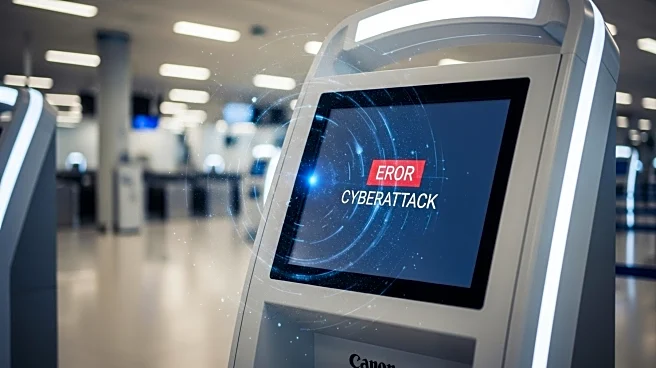What is the story about?
What's Happening?
A cyberattack has disrupted check-in systems at several European airports, causing significant flight cancellations and delays. The attack affected software provided by Collins Aerospace, a U.S.-based company, which is responsible for systems that facilitate passenger check-in, boarding pass printing, and baggage dispatch. Brussels Airport has been particularly impacted, with nearly 140 departing flights canceled for Monday due to the inability to deliver a secure version of the check-in system. The cyber-related disruption began late Friday, affecting airports in Berlin, Brussels, and London, although many other European airports remain unaffected. The European Commission has stated that aviation safety and air traffic control were not compromised, and the origin of the cyberattack is still under investigation.
Why It's Important?
The cyberattack on Collins Aerospace's systems highlights vulnerabilities in critical infrastructure, particularly in the aviation sector. The disruption has led to significant operational challenges for airports, airlines, and passengers, emphasizing the need for robust cybersecurity measures. The incident could have broader implications for U.S. companies involved in international operations, as it underscores the potential risks associated with cyber threats. The economic impact is notable, with flight cancellations affecting airline revenues and passenger travel plans. This event may prompt increased scrutiny and investment in cybersecurity protocols within the aviation industry to prevent future occurrences.
What's Next?
Airports and airlines are working to mitigate the impact of the cyberattack by employing manual check-in operations and alternative systems. Collins Aerospace is actively seeking to resolve the issue, but the timeline for a complete recovery remains uncertain. Passengers are advised to check flight statuses and use online check-in methods where possible. The investigation into the source of the cyberattack continues, with potential involvement from hackers, criminal organizations, or state actors. The incident may lead to policy discussions on enhancing cybersecurity measures in the aviation sector, both in Europe and the U.S.
Beyond the Headlines
The cyberattack raises questions about the ethical and legal responsibilities of companies providing critical infrastructure services. It highlights the need for transparency and accountability in cybersecurity practices, as well as the importance of international cooperation in addressing cyber threats. The event may also influence cultural perceptions of digital security, prompting a shift towards more proactive measures in safeguarding personal and organizational data.














